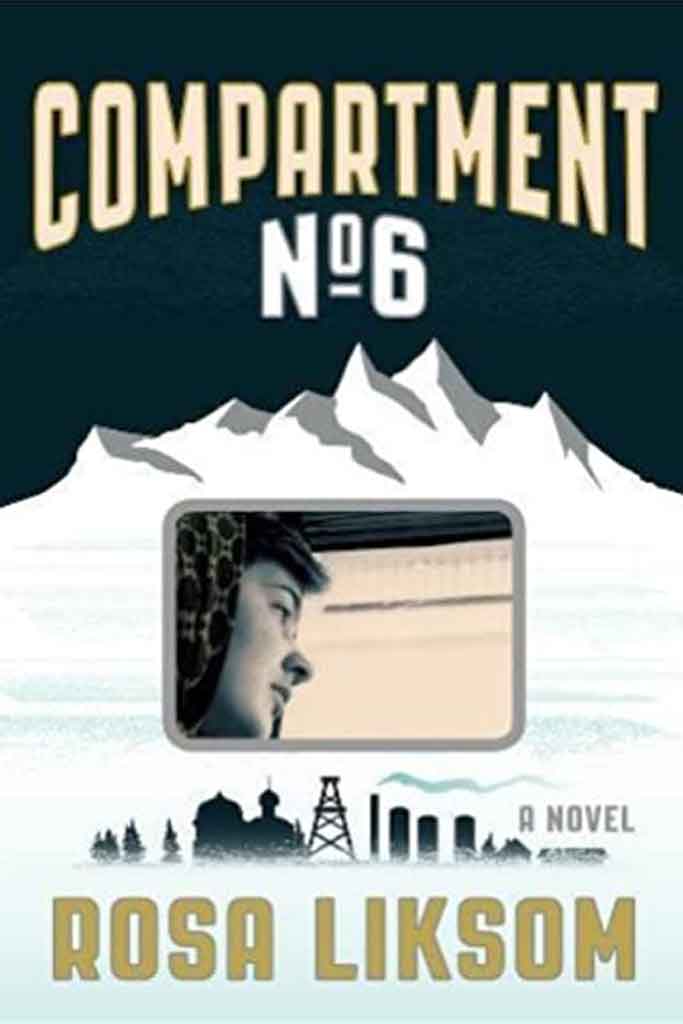Review by Torrie Jay White // October 24, 2016
Graywolf Press, August 2016
Paperback, 192 pp., $16
Compartment No. 6 is a tense, terse, dense novel. In less than 200 pages, Rosa Liksom jails the entire, crumbling Soviet Union, and gives it to us to unspool.
This novel, published in early August by Graywolf Press, starts in Moscow. A girl—we never learn her name—boards a train bound for Mongolia. She’s leaving something, that much we know, and craving the silence that a solo cross-continental train ride will afford her, but as the train is leaving, another passenger joins her.
Vadim Nikolayevich—the man, as he’s most often called—is crude, brash, and talkative. He smashes her solitude. Vadim begins to talk. Right away, he is both threatening and appealing. Vulgar and abusive in the way that he describes his relationships with women, emphatic and excited about the Soviet Union, and generous with his food and his money, Vadim paces between friend and foe. She tries to seek reassignment, and tries repeatedly to repel him—turning down his advances and even dumping nail polish remover into his vodka—but she and Vadim remain together. As the girl becomes resigned to him, she warms to him. They become traveling companions, odd, but united. As their train crosses Siberia, Vadim drinks himself stupid, waxes poetic about the Soviet Union, and tells stories about women and work camps and a lifetime of deprivation.
The girl listens, and watches.
We spend the whole novel inside her head, but we only hear her speak once. Like she does here, Liksom pairs physical setting with the girl’s emotional undercurrents: “She rested with her eyes closed. And that’s how they travelled that whole long twilit evening, each of them sleeping and waking in their own time. She was with Mitka in his room. A Jefferson Airplane song wobbled out from the little blue record player.” This fluid structure gives the story an intimate, yet voyeuristic feeling. She watches Vadim drink himself into a stupor, sees the filth of the train’s washrooms, notices snatches of rural life, and witnesses the desolate beauty of Russia. Yet rarely is she ever active—in the train, she listens as Vadim speaks, and in the small towns the train stops at, she observes without engaging the people or scenes she watches. Only in her memories of what she’s leaving and occasionally in the cities that the train stops in do we see the girl act. She spends the novel trapped—clearly escaping something, but paralyzed in her flight.
The novel becomes quiet, its roaring power kept outside the train’s windows. Between the stories that Vadim tells and the countryside that their train moves through, Liksom catalogues the Soviet Union, using her extraordinary prose to gather the details of an entire nation—promise, want, poverty, corruption, brokenness, hopelessness, hopefulness—into dense, lyrical language. Each word is precise, a note on a piano played well, and when strung together, they make the Soviet Union as real and complex as it is. Compartment No. 6 quickly becomes not about what the girl is traveling to—Ulan Bator and ancient petroglyphs—or what she is traveling away from—a boyfriend with mental health issues and a love affair with his mother—but about Russia, the Soviet Union, desperate in its final years.
The train sped east and everyone waited for morning. The girl thought of travelling in the hot train across dreaded Siberia, how someone might look at that train and long for Moscow, someone who wanted to be on that very train, someone who had escaped from a camp without a rifle, without food, with nothing but wet matches in his pocket, traveling on skis stolen from a guard, a rusted knife in his pocket, someone willing to kill, willing to suffer freezing and exhaustion, willing to throw himself at life.
This is the core of the story: Underneath the deteriorating empire, underneath the relentless want, underneath the primal desperation of the escaping person, there is brutal and persistent hope. Even amidst the girl’s passivity, there is the thrum of life and of a fierce and potent energy. Vadim is that prisoner, and as the girl listens to him recount the ways that he, starved, suffered and savage, threw himself at the merciless world, we feel the deep thrum of her passivity breaking. She is preparing, her desire for life overwhelming her weariness.
This novel is extraordinary in its scope. It’s relentless in its mission to bear witness to a complex and now lost nation, but it always, always remains specific. Compelling and repelling, it’s a story that takes you in, and holds you. Liksom drags her readers through the waste and ruin and beauty of Russia, and only when she’s through with you, will she pull back the curtain, and let you see its hope.
ABOUT THE REVIEWER
Torrie Jay White is a writer based in Minneapolis, Minnesota. She holds a degree in English literature and History, and currently works in museum education. Her work has appeared in most recently in fields and Litro Magazine, and she is currently working on her novel, This Dark Place. She talks writing, books, and personal stories at https://torriejayw.wordpress.com/, and tweets wit and wisdom from @Torriejay.






